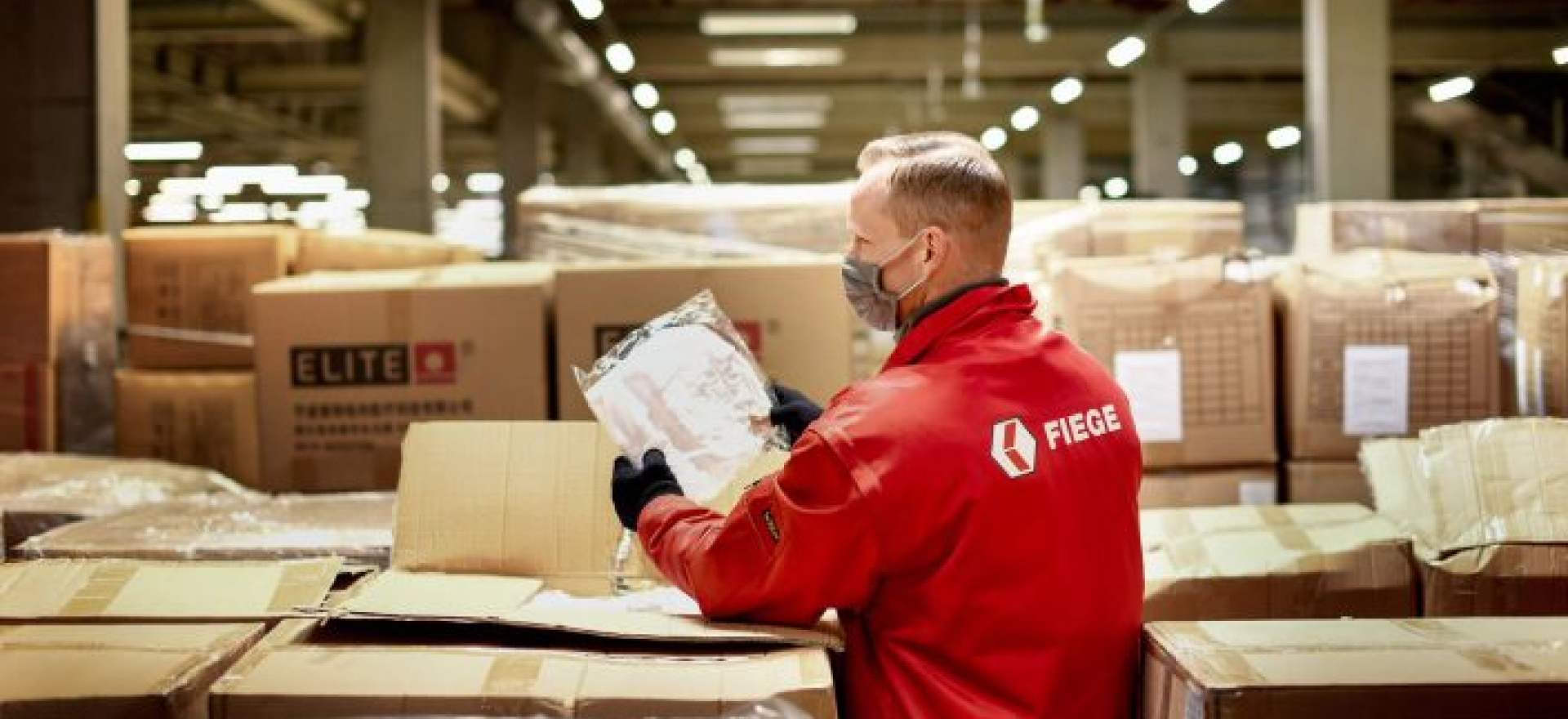Our task: Supply of masks by FIEGE during the Covid-19 pandemic

Supply of masks by FIEGE during the Covid-19 pandemic
We wish to make the following statement about FIEGE’s role in the storing, distribution and procurement of personal protective equipment during the Covid-19 pandemic as well as the special report of Germany's Federal Ministry of Health:
FIEGE was formed in 1873. With a team of 22,000 employees and 4.6 million-square metres of logistics space, we are one of Germany’s and Europe’s largest contract logistics companies that has over 25 years of experience in healthcare logistics. In Germany alone, FIEGE regularly supplies 500+ hospitals with its transport network for medical instrumentation through which it can reach every hospital in Germany within four hours.
The special report by Germany's Federal Ministry of Health, the BMG, has been available to FIEGE in the version as published on the internet, without redactions, since 4 July 2025.
FIEGE was not interviewed during the preparation of the special report by the special investigator, Dr Sudhof, even though we assured our full support with the reappraisal to both her as well as the then Minister of Health, Prof Dr Karl Lauterbach, as far back as July 2024, following the public announcement of the investigation. Accordingly, the report by Dr Sudhof has left us feeling irritated as it recklessly disregards the unfair discreditation of a family business which has been operating reliably for over 150 years.
The report contains five key topics that involve us. We categorise these as follows:
1. Contract award:
- The BMG awarded FIEGE a contract because we, based on the early experience relating to COVID at our logistics locations in Italy, had the capacity to act unusually fast. Having the capacity to act in this case means to have been able to store supplies and handle them immediately.
- At the end of February 2020 already, FIEGE had a contingency concept for the storage and distribution of critical supplies in Germany ready for immediate roll-out.
- On 4 March 2020, FIEGE sent out the contingency concept to clients, partners and health organisations, including the former Federal Health Minister, Jens Spahn.
- On 9 March 2020, Jens Spahn contacted FIEGE about this concept.
- The further coordination ensued as from 11 March 2020 between the responsible department head at the BMG and the responsible project manager at FIEGE.
- On 13 March, FIEGE received the first supplies at its location in Apfelstädt near Erfurt. As Dr Sudhof’s report mentions, the BMG did enquire with other service providers; however, they required a longer lead time.
- The BMG awarded the contract officially to FIEGE on 25 March only. Therefore, FIEGE – due to the extraordinary emergency caused by the pandemic – stepped up in advance at its own risk.
- Concrete reasons and details regarding the Federal Ministry of the Interior (BMI) and the Federal Ministry of Defence (BMVg) allegedly warning against the award of a contract to FIEGE, as can be read at times in the press, are not apparent to us following our assessment of the published report. Merely potential risks ‘on the last mile’ [“auf der letzten Meile”], i.e., during the onward transport of the supplies to the destination, are mentioned. The report does not document whether this refers to operational risks on the last mile or the risk of a potential theft of supplies during transportation. The latter would be corroborated by the fact that during the project and due to the then emergency, a police escort accompanied the transports and that the warehouse location was guarded by the German Armed Forces, the Bundeswehr.
2. Performance capability:
- FIEGE performed the agreement with the BMG in full and reliably. Originally, it had been agreed contractually to provide 17,000 square metres of storage space for the simple logistical handling of materials.
- Additional service requests by the BMG, such as, for example, a TÜV inspection of the supplied masks or lot tracking, was only defined by the BMG afterwards.
- Also, the spatial requirements grew following the openhouse approach which the BMG conducted in April of 2020, to over 200,000 square metres.
- FIEGE successfully mastered this unexpected, extreme situation jointly with other service providers for the BMG. Within a very short period of time, FIEGE made 40,000 square metres of space available at twelve locations in several countries.
- Contrary to what is suggested in Dr Sudhof’s report, there was no ‘logistical collapse’ [“Kollaps der Logistik”] nor was ‘FIEGE overwhelmed’ [“Überforderung von FIEGE”] – and neither does the report available to us produce any evidence substantiating this. Not only is this claim provably false, but also defamatory and harmful to our business – and we resolutely reject these claims.
- Instead, the following is correct: The supply chains were demonstrably fully operational non-stop every single day even during the open house approach. The numbers: Before the open house approach, around 4.7 million items were delivered to FIEGE every day; during the open house approach, this figure totalled roughly 9.4 million items, which corresponds to a growth rate of 100 per cent within a few days. Despite the resulting logistical challenges, supplies were received every single day. And even outbound operations, following coordination with the BMG and in collaboration with other service providers, were served at all times.
- What also speaks for FIEGE’s performance capability beyond this is the fact that the BMG awarded additional contracts in the context of public calls for tender to FIEGE during the pandemic, and even long after the open house approach had been concluded; these contract awards include a customary review of our efficiency.
3. Contract volume:
- The contract volume named in the report of ‘roughly 1.5 billion euros’ [“knapp 1.5 Milliarden Euro”] does not correspond to the facts.
- In fact, the amount invoiced by FIEGE for logistical services to the BMG amount in total to 126.3 million euros, of which 97.6 million euros fall to the airlift set up with Lufthansa between China and Germany; 14.9 million euros are allocated to sea freight and 13.8 million euros to the storage, the distribution and transportation of the masks across Germany.
- In the context of a procurement contract, FIEGE also procured as a procurement service provider in total 564 million masks for the BMG. The costs charged for these and forwarded to the BMG amount to 859 million euros in total. The average price for the masks procured by FIEGE came to 2.93 euro per FFP2 mask, and 0.41 euro per surgical mask, and is therefore much lower than that under the open-house approach (4.50 euro per FFP2 mask and 0.60 euro per surgical mask).
- Moreover, the report confirms that FIEGE’s claims ratio was lower than usual, namely ‘below average’ [“unterdurchschnittlich”]. FIEGE thus gave the BMG access to cheaper and, simultaneously, higher quality masks than those under the open house approach.
4. Compensation for damages:
- Neither the BMG directly nor EY (the auditing firm commissioned by the BMG) specified a concrete preliminary claim or claim for damages – despite EY having been instructed by the BMG to review potential claims for damages against all service providers. There were, quite simply, no grounds for claims for damages against FIEGE..
- The liability limits named in the report were very extensive for a transaction of this scale and above what FIEGE agrees to for customary – even significantly larger – logistics projects.
- The ‘disruptions in performance’ [“Leistungsstörungen”] of which FIEGE was criticised in the report are without any contractual foundation. The scope of services listed by Dr Sudhof were not part of the agreement and were not owed by FIEGE. Our logistics assignment was for the handling of materials only. The above items, such as the TÜV inspections or lot tracking, were requested by the BMG only subsequently.
5. Arbitration:
- It is correct that FIEGE supports the BMG in enforcing potential claims against suppliers and continues to do so. As the report confirms, a warranty disclaimer was rightly agreed for the contract pertaining to the procurement of masks as a procurement service provider. Under the respective agreement, FIEGE put the BMG in the position to review and pursue claims at its own responsibility.



